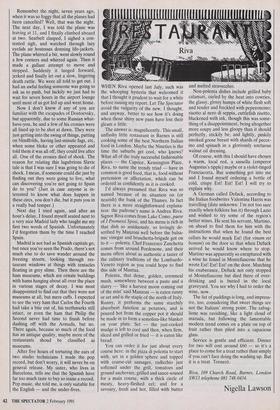WHEN Riva opened last July, such was the whooping hysteria
that welcomed it that I thought it prudent to wait for a while before issuing my report. Let The Spectator avoid the vulgarity of the new, I thought, and anyway, better to see how it's doing when those shiny new pans have lost their gleam a little.
The answer is: magnificently. This small, unflashy little restaurant in Barnes is still cooking some of the best Northern Italian food in London. Maybe the Nineties is the time the suburbs get cool, who 'plows? What all of the truly successful fashionable places — the Caprice, Kensington Place, Riva, to name the trendy triad — have in common is good food, that is, food without pretension or affectation, which can be ordered as confidently as it is cooked.
I'd always presumed that Riva was so named because of its situation on (or nearish) the bank of the Thames. In fact there is a more straightforward explana- tion: the padrone's name is Andrea Riva. Signor Riva comes from Lake Como, paese of I Promessi Sposi, and his menu is rich in that dish so assiduously, so lovingly de- scribed by Manzoni well before the balsa- mic vinegar and bruschetta-brigade got on to it — polenta. Chef Francesco Zanchetta comes from around Pordenone, and their menu offers about as authentic a taster of the culinary traditions of the Lombardo- Veneto region as you could hope to find this side of Mantua.
Polenta, that dense, golden, cornmeal mush, somewhere between a paste and a slurry — 'like a harvest moon coming out of the mist' said Manzoni — is eaten runny or set and is the staple of the north of Italy. Runny, it performs the same starchily absorbent function as potatoes, and is poured hot from the copper pot it should be made in to form a semolina-like blanket on your plate. Set — the just-cooked mudge is left to cool and then, when firm, sliced and grilled or fried — it is eaten like bread.
You can order it for just about every course here: in the pizza di polenta to start with, set in a golden sphere and topped with coarse-cut sausages, radicchio just softened under the grill, tomatoes and ground anchovies; grilled and sauce-soused for a main course, with a thick circle of meaty, heavy-fleshed eel; and for a savoury, fresh and hot, filled with butter and melted stravecchio.
Non-polenta dishes include grilled baby calamari, curled by the heat into cowries, the glassy, glossy humps of white flesh soft and tender and freckled with peperoncino; risotto al nero di seppia, cuttlefish risotto, blackened with ink, though this was some- thing of a disappointment, being altogether more soupy and less gloopy than it should perfectly, stickily be; and lightly, pinkily smoked goose breast with shards of pecor- ino and spinach in a gloriously unctuous walnut oil dressing.
Of course, with this I should have chosen a warm, local red, a sassella (emperor Augustus's tipple) maybe or a violet-tinged Franciacorta. But something got into me and I found myself ordering a bottle of cold, crispy Est! Est! Est! I will try to explain why.
A German called Defuck, according to the Italian foodwriter Valentina Harris was travelling (date unknown: I'm not too sure exactly when folklore has it) through Lazio and wished to try some of the region's better wines. He sent his servant, Martino, on ahead to find them for him with the instructions that when he found the best cellars he would mark Est! (for vinum est bonum) on the door so that when Defuck arrived he would know where to stop. Martino was apparently so enraptured with a wine he found in Montefiascone that he wrote Est! Est! Est! on the door. Matching his exuberance, Defuck not only stopped at Montefiascone but died there of over- drinking and is buried in the local graveyard. You see why I had to order the wine, now.
The list of puddings is long, and impress- ive, too, considering that sweet things are not the Italians' strong point. The zabag- lione was ravishing, like a light cloud of marsala, but following the lamentable modern trend comes on a plate on top of fruit rather than piled into a capacious glass.
Service is gentle and efficient. Dinner for two will cost around £60 — so it's a place to come for a treat rather than simply if you can't face doing the washing up. But it is a treat. Tomer& Riva, 169 Church Road, Barnes, London SW13 telephone 081 748 0434.
Nigella Lawson


















































 Previous page
Previous page